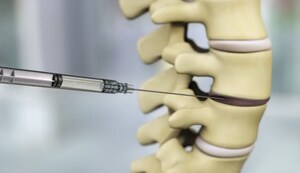DiscGenics Receives FDA Allowance of IND to Commence Clinical Study of Its Degenerative Disc Disease Therapy
SALT LAKE CITY, Oct. 3, 2017 /PRNewswire/ -- DiscGenics, Inc., a clinical stage regenerative medicine company focused on developing regenerative therapies that alleviate pain and restore function in patients with degenerative diseases of the spine, is pleased to announce that it has been notified by the U.S. Food and Drug Administration (FDA) that an Investigational New Drug (IND) Application for a clinical study of its first product candidate, IDCT, may proceed.
IDCT is a homologous, allogeneic, injectable cell therapy that utilizes proprietary Discogenic Cells to offer a non-surgical, potentially regenerative solution for the treatment of patients with mild to moderate degenerative disc disease (DDD).
DDD is a chronic and progressive disease that is characterized by the breakdown of extracellular matrix within the intervertebral disc, and is a major contributor to chronic low back pain. Low back pain can lead to disability that may result in missed work, lost wages, and in some instances, addiction to pain medication, including opioids. The condition affects approximately one-quarter of U.S. adults at a given time and costs the U.S. more than $100B per year. Current treatment options are limited to pain management and alternative remedies in the earlier stages and surgical intervention in the later stages.
DiscGenics' IND acceptance allows the Company to initiate a prospective, randomized, double-blinded, vehicle- and placebo-controlled, multicenter clinical study to evaluate the safety and preliminary efficacy of IDCT in subjects with single-level, symptomatic lumbar intervertebral disc degeneration. The 60-subject trial is expected to begin enrolling in the U.S. in Q4 2017.
"I am very excited to be participating in the clinical development of this possibly game-changing regenerative therapy for patients with chronic low back pain," said Dr. Domagoj Coric, Principal Investigator for the study and a practicing neurosurgeon at Carolina Neurosurgery and Spine Associates in Charlotte, NC. "Preclinical studies indicate that IDCT can safely normalize disc architecture and restore disc height in several animal models. If IDCT demonstrates similar results in human subjects, the outcome could be reduced pain and disability, potentially revolutionizing the way we treat patients with DDD by bypassing many mid-stage treatments and potentially eliminating non-restorative, late-stage surgeries."
"We are thrilled to be commencing the clinical phase of our evaluation of IDCT because we believe that it has the potential to offer pain relief and restored function to millions of patients suffering from the debilitating effects of chronic low back pain," said Flagg Flanagan, Chief Executive Officer and Chairman of the Board of Directors for DiscGenics. "We have worked closely with FDA over the past several years to design our preclinical studies to support our eventual IND filing, so receiving the go-ahead from the Agency to begin in-human trials is a critical step forward for our clinical program."
The IND was filed electronically with the FDA Center for Biologics Evaluation and Research (CBER) – Office of Tissues and Advanced Therapies (OTAT).
About DiscGenics
DiscGenics is a privately held, clinical stage regenerative medicine company focused on developing regenerative therapies that alleviate pain and restore function in patients with degenerative diseases of the spine. DiscGenics is harnessing the restorative potential of cells native to the intervertebral disc to develop what we hope will be a profound therapeutic option for millions of patients suffering from the debilitating effects of back pain. DiscGenics' first product candidate, IDCT, is a homologous, allogeneic injectable cell therapy for the treatment of patients with mild to moderate degenerative disc disease.
SOURCE DiscGenics, Inc.
Related Links
WANT YOUR COMPANY'S NEWS FEATURED ON PRNEWSWIRE.COM?
Newsrooms &
Influencers
Digital Media
Outlets
Journalists
Opted In






Share this article